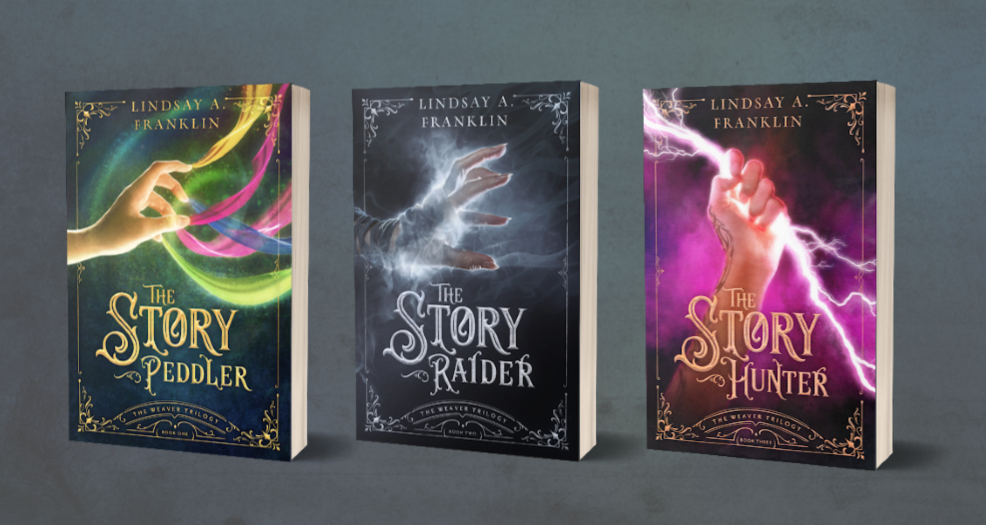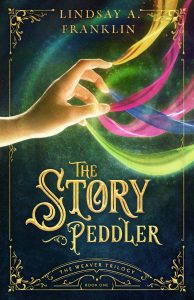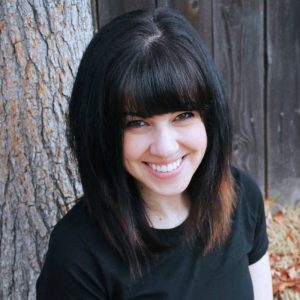Can you share a little about your recent book?
My latest release is the third in a series, so I probably shouldn’t share too much (spoilers!). But I can tell you about the series overall. In The Weaver Trilogy, art is magic, and when supernaturally gifted storytellers weave tales, strands of light and color pour from their hands. Those strands then collect together and crystallize into solid objects to sell. All young story peddler Tanwen En-Yestin wants is to use her gift to work her way to the capital city and become Royal Storyteller to the king. Instead, story strands she can’t control begin pouring from her hands, accusing the king of treason—and now she’s on his most-wanted list.

Why do you write? Do you have a theme, message, or goal for your books?
My first goal is always to tell a good story—one that grips my reader emotionally and makes them fall in love with my characters. And as a woman of faith, my worldview will always be laced throughout my storytelling. But I also think fiction is a wonderful place to explore deep and difficult topics. The Weaver Trilogy touches on identity, found families, loyalty, courage, racism, trauma, and more.
How long have you been writing?
Since I was little. I wrote my first “novel” when I was eleven. But I entered the publishing industry, complete draft in hand, about ten years ago.
And how long did it take you to get your first major book contract? Or are you published non-traditionally? How did that come about?
I got agented within my first year in the industry, but it took us six years to sell my first full-length fiction to a publisher.
Which of your books is your favorite?
Tough question! We’ll say the most recent, The Story Hunter. But that answer could change tomorrow.
Do you have a favorite character or scene in one of your books?
It’s really hard to pick a favorite character, but the main character in The Weaver Trilogy is based on my daughter, and that’s special. I love her bubbly, positive energy, though she can have a sharp tongue when she wants (very like a certain twelve-year-old who lives in my house).
Tell us about an award you won that was particularly meaningful.
I was blown away by the award recognition The Story Peddler received last year. It was not expected, to say the least. Winning the Carol Award at ACFW was a huge moment for me, as was being named Book of the Year and Alliance Award winner at Realm Makers. For the Carol, it was overwhelming and incredible for a fantasy book—my fantasy book—to win in the debut category. Realm Makers is my speculative fiction community, and being acknowledged within one’s community like that is…humbling. Such an honor.

How long does it take you to write a book?
I spend as long as I need pre-writing (brainstorming, figuring out who my characters are, outlining), sometimes a year or more, depending on how deeply focused on the work I’m able to be. Once I start writing, I can finish 100K-word novel in a few months fairly easily. The outline is the key for me. I have written a whole novel in a month, but that’s a breakneck pace I don’t enjoy at all!
What’s your writing work schedule like?
I’m not very creative until the afternoon hits, and really, my best time to write is after 6:00 p.m. If I’m on deadline, I’ll try to write a couple thousand words per day. If I’m really on deadline, you might catch me writing eight or ten thousand a day, but I really try to plan well enough to avoid that.
Do you have an interesting writing quirk? If so, what is it?
I listen to very loud music when I’m writing. When I read or edit, I can’t have anything playing in the background except instrumental scores. But when I write? Super loud music, with lyrics and all.
What has been your greatest joy(s) in your writing career?
There have been so many unexpected joys. Getting notes or tags on social media from readers who read something in my stories that touched them will never, ever get old. Being able to stand at an awards podium and thank the agent who believed in me when I was a very green writer (and stuck by me through all the years of rejections) and the editor who took a risk on me, even though I was unproven, was a joyous moment. Honestly, I’m so lucky that I get to do this as my career.
What has been your darkest moment(s)?
In my career? It wasn’t the rejections, though they do sting. I’m a strong supporter of indie publishing, so I knew I had options if traditional publishing didn’t work out for me. There was some business-related instability at one of my publishers for a while, and that was very, very hard. Because for a while, I thought my dream had finally come true but was going crumble beneath me, and there was nothing I could do to stop it. Everything worked out, thankfully. But that was a hard season.
How many times in your career have you experienced rejection? How did they shape you?
Goodness. A lot? My agent and I tried to sell my first fantasy series for about a year. Then we tried to sell a YA contemporary stand-alone for about a year. We got very close to a contract with both of those books, but ultimately ended up with a pile of rejections. And that’s when I began writing The Weaver Trilogy. The thing is, the rejection never really stops in publishing. Once you have a contract and your book baby is out in the world, you face “rejection” from readers all the time. Those one- and two-star reviews hurt, but I think they have helped me let go of my perfectionism. No book will be universally well-received. No book is for everyone, and that’s perfectly okay.
Where do you get your ideas?
From everywhere. News headlines, historical events, random thoughts flittering through my brain, musings about the past, dreams…
Who is your favorite author to read?
This is an impossible question! I’m not sure if I have a favorite because every author brings something really unique to the table.
What advice can you give aspiring writers that you wished you had gotten, or that you wished you would have heeded?
Be patient. Work hard, but don’t rush to publication. Once you’ve crossed over into that next phase of your career, you can’t go back to the days before your first contract. That season is beautiful, full of learning and unbound creativity. It’s special. Don’t rush.
What are common mistakes you see aspiring writers make?
Learning from peers rather than those who are a little further down the road than they are. Now, you can and should grow alongside your peers. Critique partners are wonderful for this. But I routinely see bad writing and marketing advice given (and taken) in online writers’ groups because everyone participating in the conversation is inexperienced. I’m a big fan of going your own way, doing your own thing. But I also think it’s important to learn from those who have traveled the path before you—to glean their wisdom so you know how best to apply your own spin.
Where/How do you recommend writers try to break into the market?
This certainly isn’t the only way to do it, but my career was definitely jump-started by attending writers’ conferences to learn, meet agents and editors, and connect with like-minded writers with whom I could grow.

Lindsay A. Franklin is a Carol Award–winning author, freelance editor, and homeschooling mom of three. She would wear pajama pants all the time if it were socially acceptable. Lindsay lives in her native San Diego with her scruffy-looking nerf-herder husband, their precious geeklings, three demanding thunder pillows (a.k.a. cats), and a stuffed marsupial named Wombatman. You can find Lindsay on Instagram @LinzyAFranklin.
The Weaver Trilogy is available at all major retailers.
https://lindsayafranklin.com
Facebook: https://facebook.com/lindsayafranklin
Twitter: https://twitter.com/linzyafranklin
Instagram: @LinzyAFranklin
